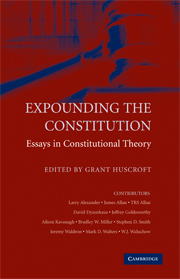Book contents
- Frontmatter
- Contents
- Preface
- Contributors
- Introduction
- PART I MORALITY AND THE ENTERPRISE OF INTERPRETATION
- 1 What Does Constitutional Interpretation Interpret?
- 2 Do Judges Reason Morally?
- 3 Constitutional Morality and Bills of Rights
- 4 Justification and Rights Limitations
- PART II JUDICIAL REVIEW, LEGITIMACY, AND JUSTIFICATION
- PART III WRITTEN AND UNWRITTEN CONSTITUTIONAL PRINCIPLES
- Index
4 - Justification and Rights Limitations
Published online by Cambridge University Press: 25 July 2009
- Frontmatter
- Contents
- Preface
- Contributors
- Introduction
- PART I MORALITY AND THE ENTERPRISE OF INTERPRETATION
- 1 What Does Constitutional Interpretation Interpret?
- 2 Do Judges Reason Morally?
- 3 Constitutional Morality and Bills of Rights
- 4 Justification and Rights Limitations
- PART II JUDICIAL REVIEW, LEGITIMACY, AND JUSTIFICATION
- PART III WRITTEN AND UNWRITTEN CONSTITUTIONAL PRINCIPLES
- Index
Summary
INTRODUCTION
One of the most common features of contemporary bills of rights is the inclusion of one or more limitations clauses. In turn, the use of limitations clauses has given rise to adjudicative structures that (at least formally) sever the definition of a right from its limitation. Bills of rights drafted in such a way are often thought of as an advance over the American model, in which reasonable limits are inherent in the conception of the constitutional rights themselves.
I intend to argue the contrary; there is no justification for the two-stage division between: (1) the definition of a legal right and determination of whether that right has been infringed in a particular instance, and (2) the determination of whether the infringement of a right is nevertheless ultimately justified. I will argue that, despite the proliferation of two-stage bills of rights, the dominant interpretation of such bills of rights creates unnecessary interpretative difficulties and threatens to distort rights adjudication.
I refer predominately to the Canadian Charter of Rights and Freedoms (the Charter) in this paper. As it happens, jurisprudence under the Charter is exemplary of a number of problems, and yet its structure (and its jurisprudence) is both celebrated in Canada as an advance over American jurisprudence and emulated in several jurisdictions. Notwithstanding the emphasis on the Charter, the conclusions drawn are applicable to any bill of rights that has been interpreted so as to uncouple the definition of rights from their limitation.
- Type
- Chapter
- Information
- Expounding the ConstitutionEssays in Constitutional Theory, pp. 93 - 116Publisher: Cambridge University PressPrint publication year: 2008
- 8
- Cited by



